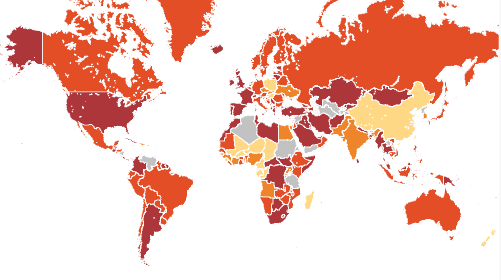Your bladder hates Covid, surprise dementia treatment, choosing the right yogurt, and more
16 Sep 2021
Posted by Andrew Kantor
One step closer to robot bodies
A team of bioengineers — pharmaceutical bioengineers — has created (and successfully tested) a prototype artificial kidney. It’s implantable, about the size of a smartphone, and combines a hemofilter with a bioreactor to replicate all the kidneys’ functions.
[T]he team married the two units into a scaled-down version of the artificial kidney and evaluated its performance in a preclinical model. The units worked in tandem, powered by blood pressure alone, and without the need for blood thinning or immunosuppressant drugs.
Next up, preparing for clinical trials.
CDC says don’t go to America
Ironically, the U.S. is on the agency’s “Level 4” Covid risk list, along with 85 other countries and territories from Afghanistan* to the Virgin Islands.

* You know, in case you were planning to do some sightseeing
Vaccine quickies
Vaccines for 5- to 11-year-olds could be authorized before the end of the year, making school a heck of a lot safer.
=AND=
ICYMI: Booster shots aren’t needed, according to, well, a whole bunch of scientists. The current vaccines do what they’re supposed to: cut the risk of serious disease.
Old drug to treat the untreatable
What if incurable vascular dementia was, in fact, curable? (First of all, whoever named it would have some ‘splaining to do.) It’s possible, though, that there is a cure — amlodipine. Yeah, the blood pressure drug.
Researchers in Manchester, England, England* found that mice treated with amlodipine “had better blood flow to more active areas of the brain” for starters, and…
The team also discovered for the first time that high blood pressure decreases the activity of a protein called Kir2.1 that is present in cells lining the blood vessels and increases blood flow to active areas of the brain. Amlodipine was found to restore the activity of Kir2.1 and protect the brain from the harmful effects of high blood pressure.
As always, more research is needed.
* Across the Atlantic sea
Does the liver cause Alzheimer’s?
The latest “ground-breaking” Alzheimer’s breakthrough comes from Australia’s Curtain University, where researchers say they’ve identified the cause: liver-fat particles carrying toxic proteins that leak into the brain.
The toxic proteins — beta amyloids — we knew about. But where they come from is more of a mystery. Or, if the Aussies are right, was more of a mystery.
“Our research shows that these toxic protein deposits that form in the brains of people living with Alzheimer’s disease most likely leak into the brain from fat carrying particles in blood, called lipoproteins.”
Captain Obvious sticks to the comics
“Headlines Are Not Doing A Good Job Of Telling The Covid Story”
The right bacteria
Taking the right probiotic can prevent the nasty gastrointestinal issues that antibiotics can cause — but the key is “the right probiotic.”
That’s always been the issue with probiotics: Just because you introduce bacteria to the gut doesn’t mean they’re actually going to do anything.
But researchers at the University of Maryland narrowed it down: They found that eating yogurt with the bacteria Bifidobacterium lactis BB-12 could help prevent diarrhea. It’s all about the acetate.
Acetate is good, but antibiotics kill the bacteria that produce it. Taking the yogurt with BB-12 helped keep acetate levels up, reducing those side effects.
[T]he reduction in acetate was significantly greater in subjects receiving the placebo yogurt as compared with BB-12 supplemented yogurt. Acetate levels in subjects who received BB-12 also returned to baseline levels by 30 days, while they remained below baseline in subjects receiving the placebo.
“The findings were so positive,” says the university, “that the NIH funded an additional follow-up study.”
Reason #624 to get vaccinated
“Patients with COVID-19 develop new, worsening overactive bladder symptoms” (from the American Urological Association).
Come into the light
There’s definitely something to the vitamin D/Covid-19 relationship — the picture is fuzzy, but it’s getting clearer. The latest: When comparing sunlight at patients’ homes with Covid-19 cases, Irish and Scottish researchers found…
…that ambient ultraviolet B radiation (which is key for vitamin D production in the skin) at an individual’s place of residence in the weeks before Covid-19 infection, was strongly protective against severe disease and death.
Good news for Philadelphia, it seems.


